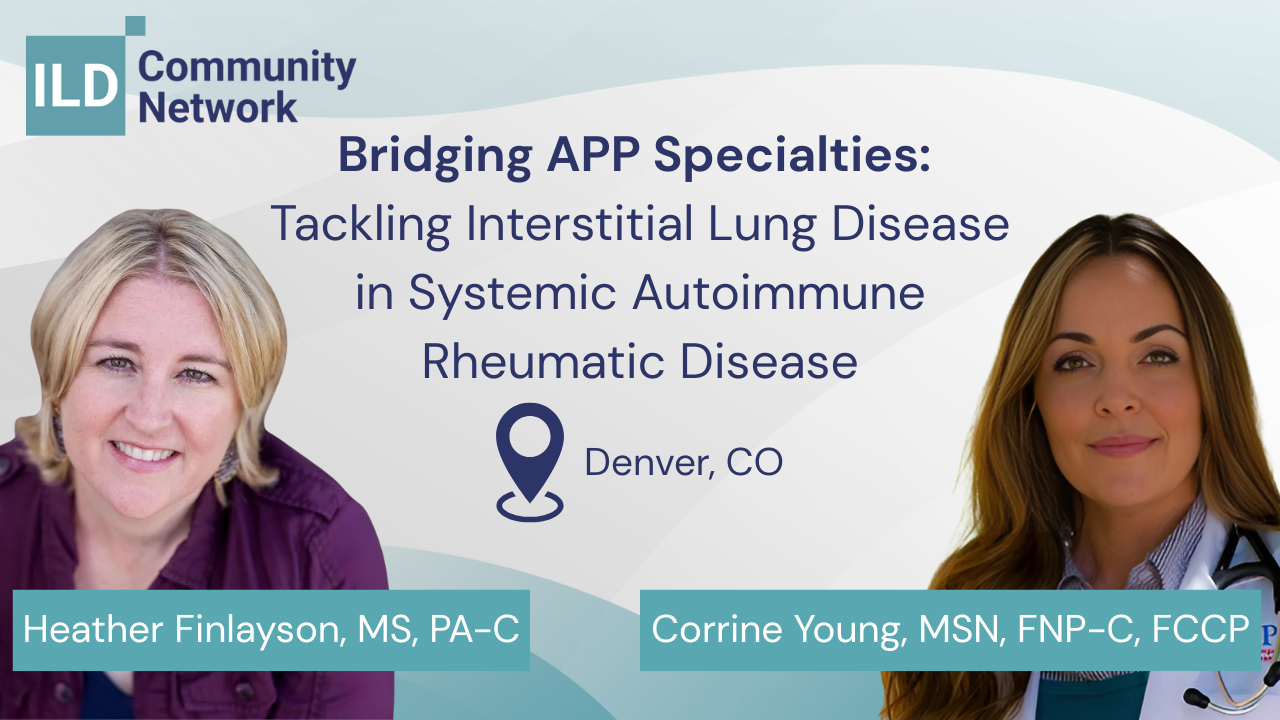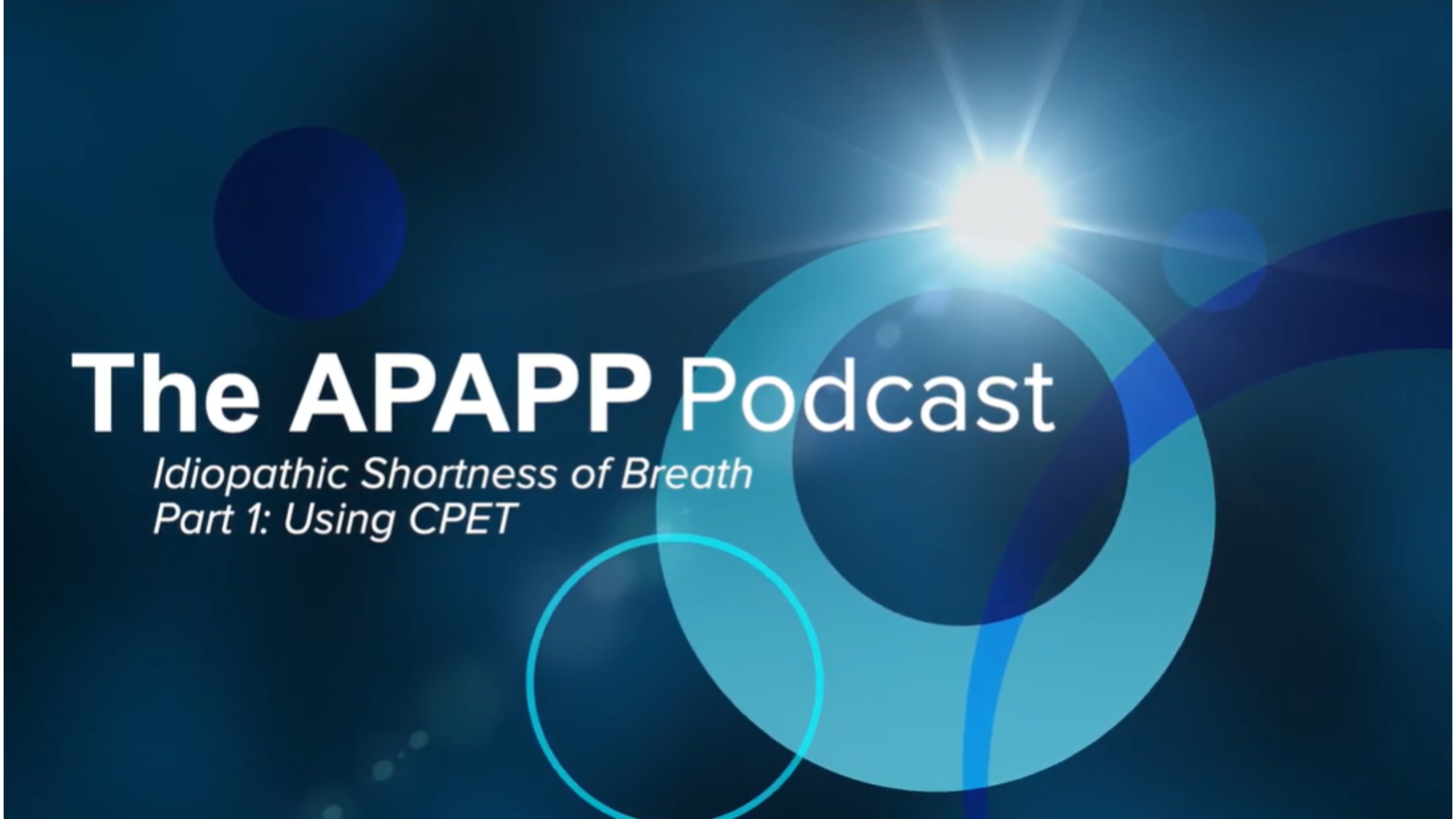
About Corinne Young
Corinne Young, MSN, FNP-C, FCCP, is a Nurse Practitioner specializing in pulmonology at Colorado Springs Pulmonary Associates in Colorado Springs, Colorado. Her passion for advancing the APP role in pulmonary medicine led her to found the Association of Pulmonary Advance Practice Providers (APAPP) a national organization for APPs working in pulmonary, critical care, and sleep medicine. Corinne understands the deficit in standardized post graduate PCCSM education for APPs and since 2018 she and APAPP have brought millions of dollars of grant funded educational programs to its members. She also has sat on the American Board of Internal Medicine’s Pulmonary Disease Board, is a section editor for CHEST Physician Magazine, and has been on multiple networks within CHEST to include the 2025 Programing committee for the CHEST Conference.
by Corinne Young
Events
ILD Digital Learning Center by Corinne Young
Podcasts
Podcasts
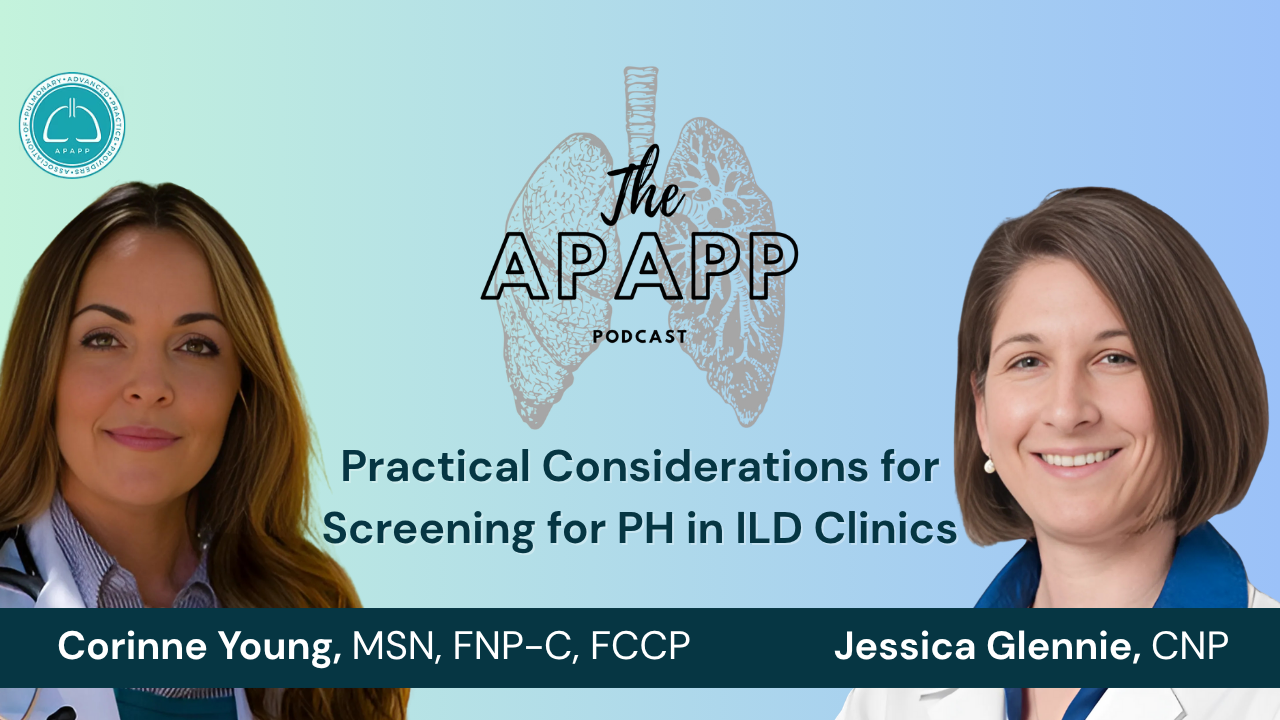

Practical Considerations for Screening for PH in ILD Clinics
 July 2025
July 2025
 17:17 m
17:17 m
In this insightful Podcast, expert advanced practice providers, Corinne Young & Jessica Glennie share practical strategies for identifying and screening for pulmonary hypertension (PH) in patients with interstitial lung disease (ILD). They discuss how to recognize subtle red flags—such as declining DLCO, changes in walk test performance, and discrepancies in pulmonary function test results—that may indicate the presence of PH. The conversation also covers when to order echocardiograms, when to refer for right heart catheterization, and how to distinguish ILD progression from the development of PH. With a focus on multidisciplinary collaboration and real-world clinical workflows, this episode offers valuable, actionable guidance for APPs, pulmonologists, and care teams managing ILD populations.
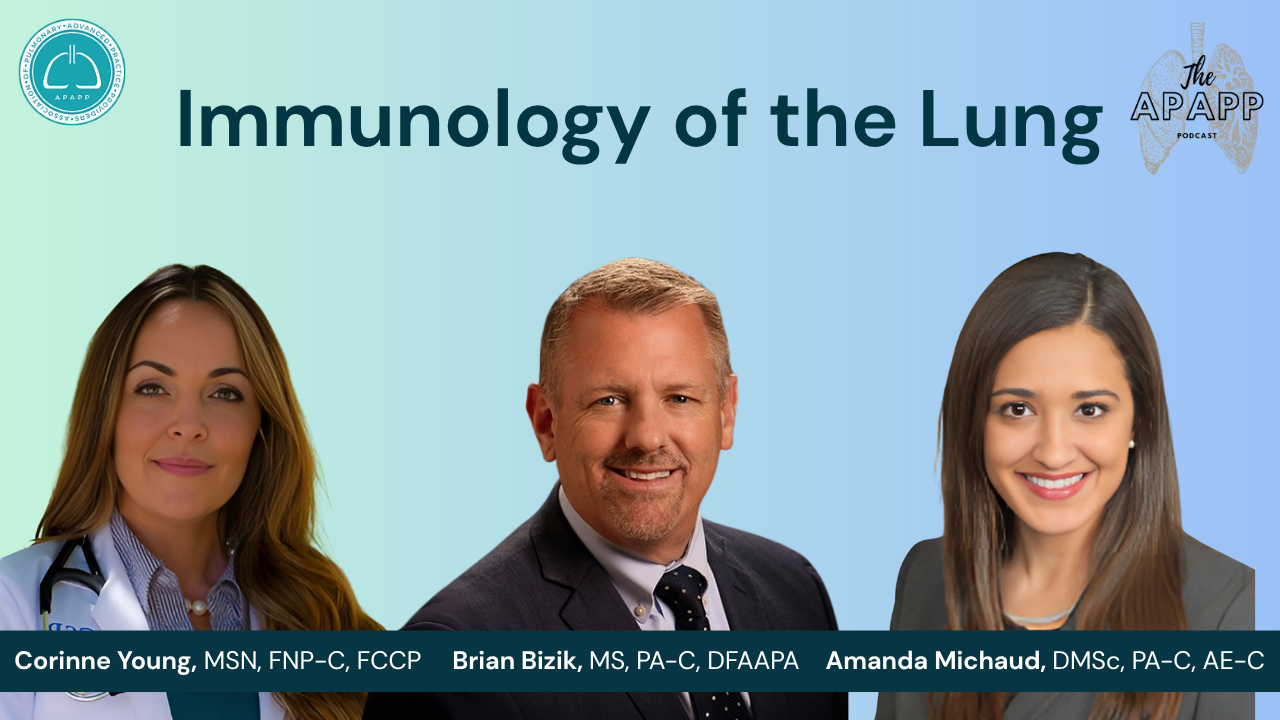

Immunology of the Lung Podcast
 July 2025
July 2025
 11:40 m
11:40 m
Tune in from the Annual APAPP National Conference for a dynamic episode of the APAPP Podcast featuring Corinne Young, FNP-C, Amanda Michaud, PA-C, and Brian Bizik, PA-C—three expert APPs leading engaging sessions on lung immunology, rare immune deficiencies, and COPD updates. Amanda breaks down the “Immunology of the Lung 101” and her “Finding the Zebras” series, where she highlights key red flags for primary immune deficiencies, sharing real patient cases and diagnostic tips to help clinicians recognize and manage these commonly missed conditions. Brian shares practical takeaways from the latest GOLD COPD guidelines, including how biomarkers like eosinophil counts can guide personalized inhaled corticosteroid decisions. Whether you're managing patients with asthma, COPD, or unexplained recurrent infections, this episode delivers clinical pearls you can apply in your practice right away. Discover why this APP-led meeting stands out as a must-attend event for pulmonary and immunology providers. Be sure to like, subscribe, and follow us for more expert-driven conversations.
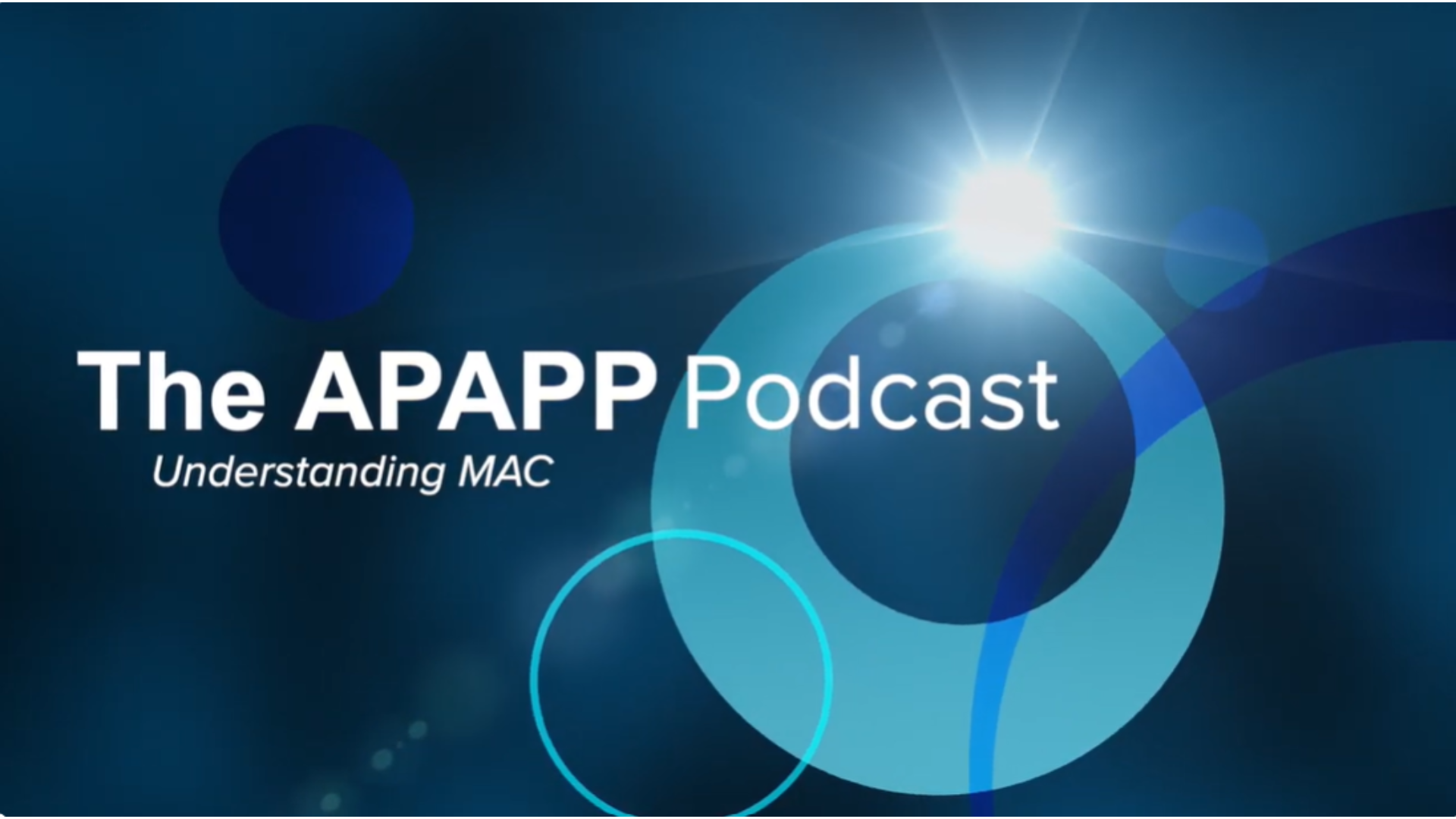

Understanding MAC with Jennifer Faber- Gerling
 December 2024
December 2024
 30:30 m
30:30 m
In this episode, Corinne Young interviews Jennifer Faber- Gerling about mycobacterium avian complex (MAC). They discuss the bacterium itself, the rise in cases, screening and diagnosis, treatment and side effects, reinfection versus reactivation, and symptom management. Jennifer emphasized the importance of close surveillance, collaboration with a multidisciplinary team, and individualized care for patients with MAC.
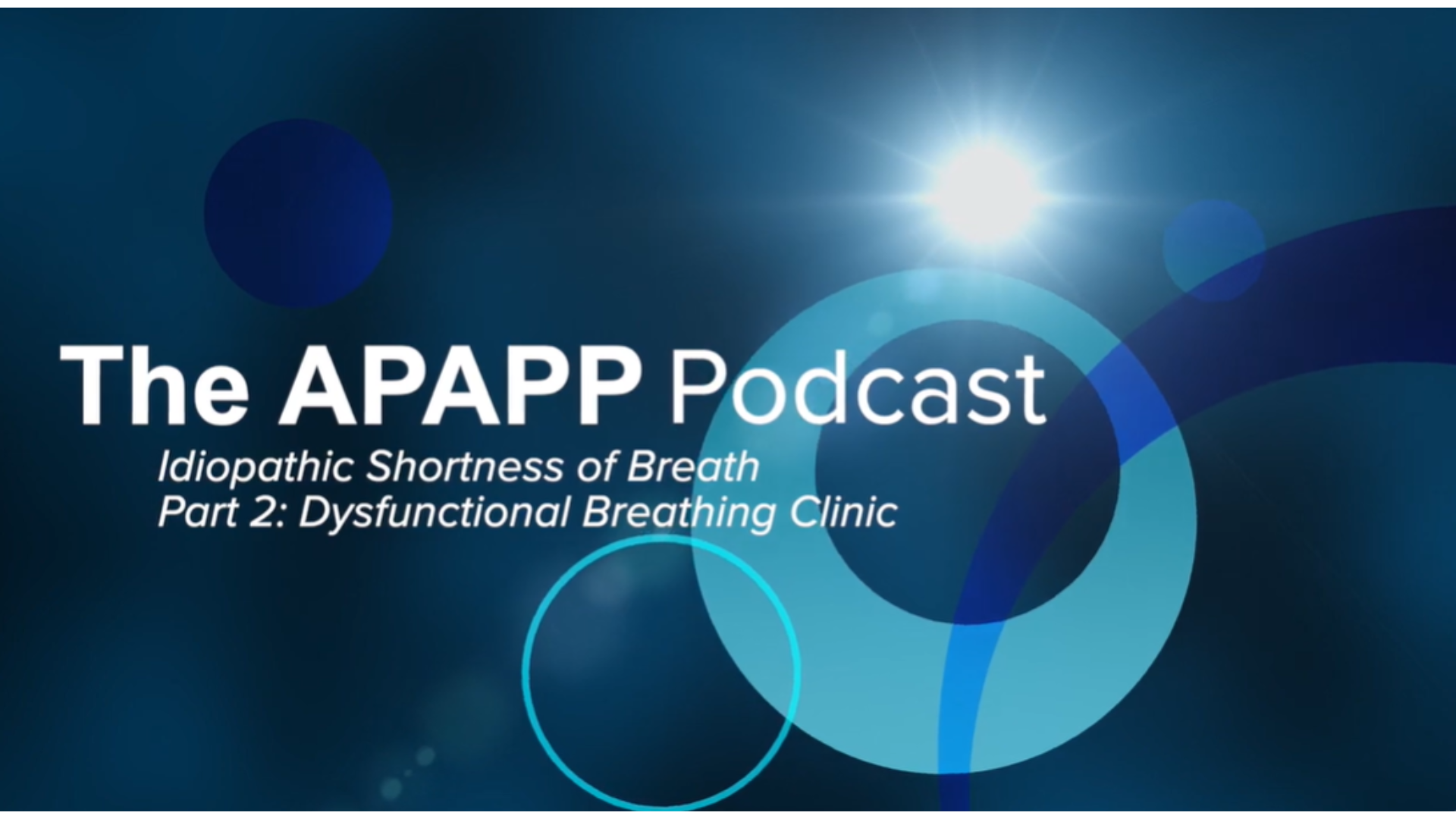

Idiopathic Shortness of Breath part 2 Dysfunctional Breathing Clinic
 December 2024
December 2024
 29:41 m
29:41 m
Nurse practitioner Cori Fratelli from National Jewish Health discusses breathing pattern disorders, related to unexplained dyspnea. Cori advocates to consider these disorders, discusses treatment methods like breath retraining, inspiratory muscle training, and emphasizes the need for more research and specialized clinics.
Webcast
Webcast
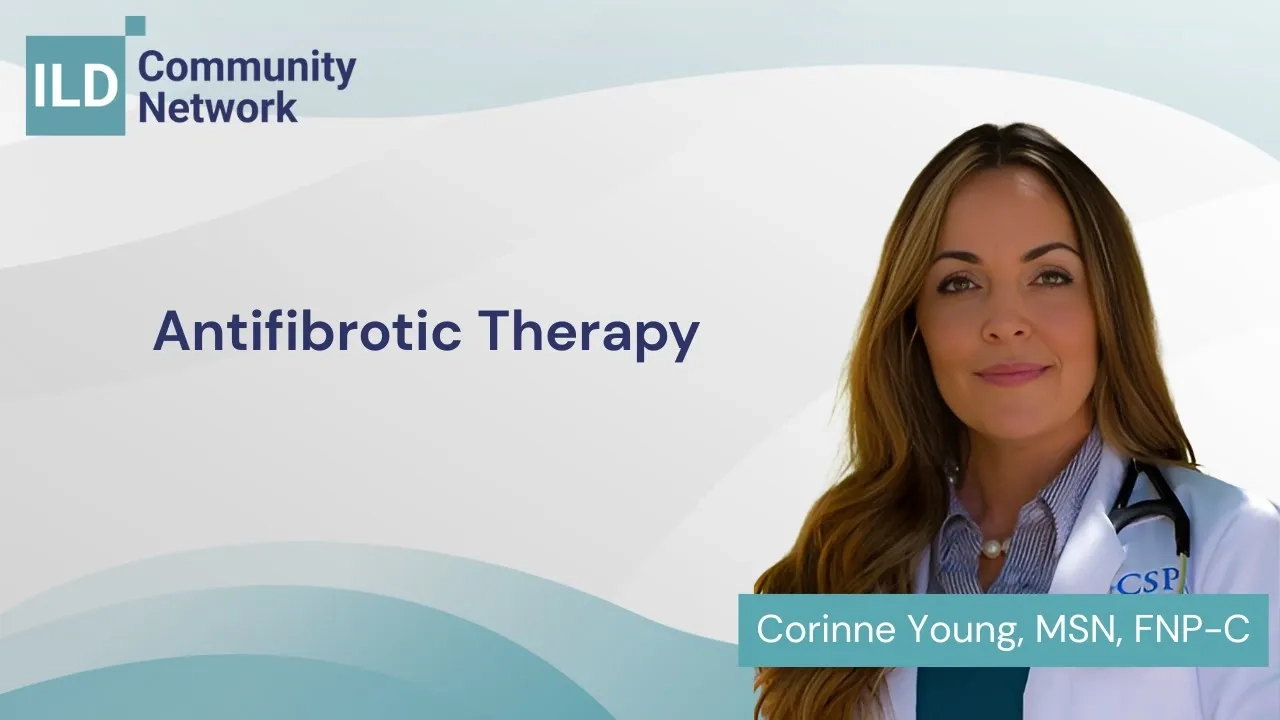

Antifibrotic Therapy
 October 2025
October 2025
 06:40 m
06:40 m
In this session, Corinne Young reviews the evolution of antifibrotic therapies for interstitial lung disease, beginning with the 2015 U.S. approval of pirfenidone (Esbriet) for idiopathic pulmonary fibrosis (IPF). Pirfenidone works by targeting TGF-β and TNF-α to slow fibroblast proliferation and collagen synthesis, though patients often experience gastrointestinal side effects and fatigue. The discussion also covers nintedanib (Ofev), a tyrosine kinase inhibitor that blocks multiple growth factor pathways (VEGF, FGF, PDGF) and is now approved for both IPF and other progressive fibrotic lung diseases. Clinical trials such as CAPACITY, ASCEND, INPULSIS, and INBUILD demonstrated that these antifibrotics significantly slow the rate of lung function decline and disease progression. The talk concludes by emphasizing careful side-effect management, liver monitoring, and appropriate patient selection to optimize outcomes with these cornerstone antifibrotic therapies.
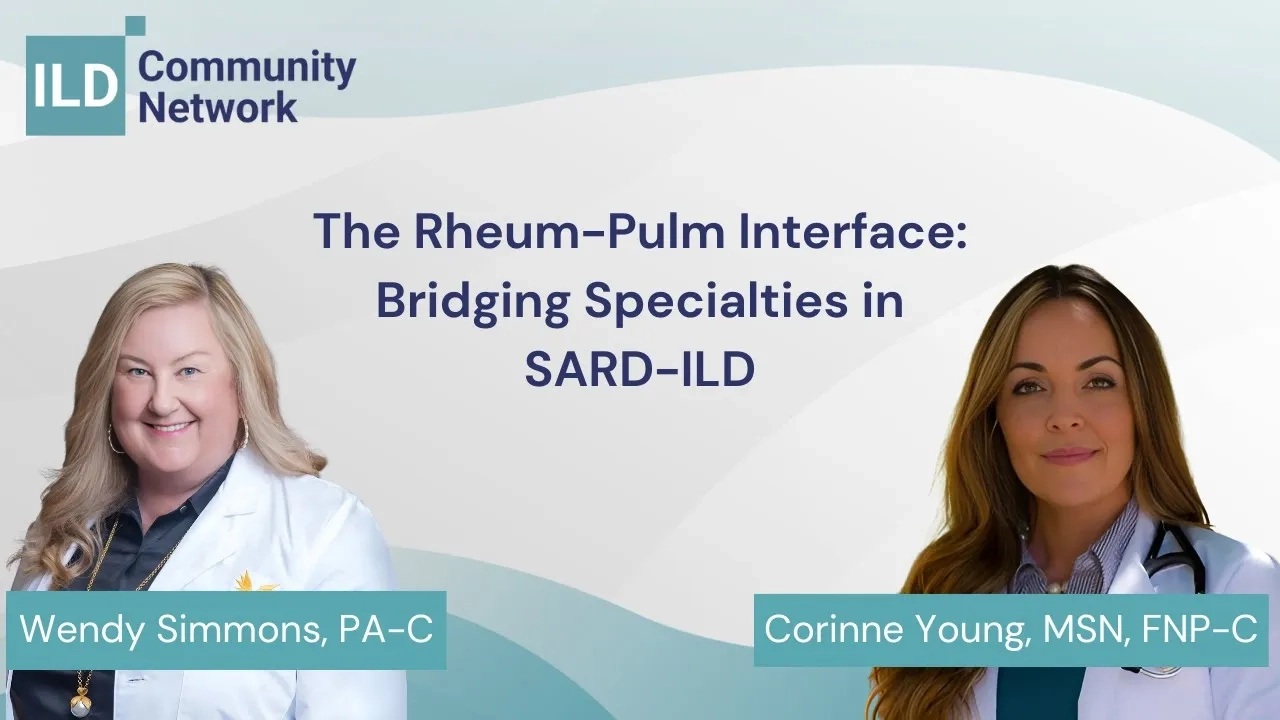

The Rheum-Pulm Interface: Bridging Specialties in SARD-ILD
 October 2025
October 2025
 11:21 m
11:21 m
In this session, Corinne Young and Wendy Simmons highlight the importance of a multidisciplinary approach to managing interstitial lung disease (ILD) in patients with systemic autoimmune and rheumatologic disorders. Collaboration between rheumatology, pulmonology, and radiology teams is key to early recognition, diagnosis, and treatment planning—especially given the high risk of ILD-related morbidity and mortality in conditions like systemic sclerosis, rheumatoid arthritis, lupus, and Sjögren’s syndrome. The discussion reviews ACR screening guidelines, emphasizing the role of high-resolution CT imaging, pulmonary function testing, and oxygen desaturation monitoring. It also covers evidence-based first-line and escalation therapies, including mycophenolate, cyclophosphamide, and rituximab, while underscoring the need for frequent assessment, early intervention, and coordinated care to improve patient outcomes.
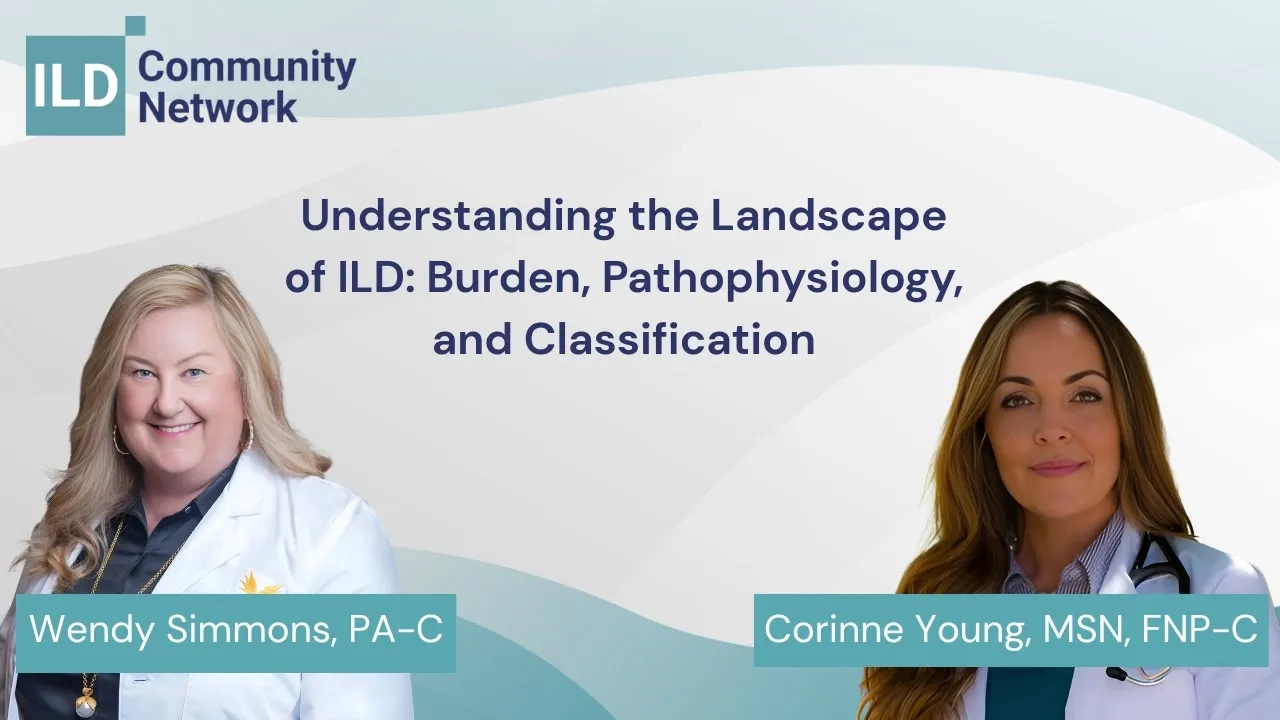

Understanding the Landscape of ILD: Burden, Pathophysiology, and Classification
 October 2025
October 2025
 20:49 m
20:49 m
In this presentation, pulmonary nurse practitioner Corinne Young and rheumatology physician assistant Wendy Simmons explore the complex relationship between interstitial lung disease (ILD) and connective tissue diseases (CTDs). Together, they provide a multidisciplinary perspective—highlighting how collaboration between pulmonology, rheumatology, and radiology leads to earlier diagnosis, better management, and improved outcomes. The session covers ILD classifications, common causes such as autoimmune disorders, environmental exposures, and drug toxicities, as well as diagnostic tools including high-resolution CT imaging, pulmonary function testing, and serologic assays. The speakers also discuss the importance of recognizing progressive phenotypes, understanding imaging patterns like UIP and NSIP, and tailoring therapy based on disease behavior. This session emphasizes that in ILD, time is lung—early recognition and coordinated care are essential to preserving function and extending quality of life.
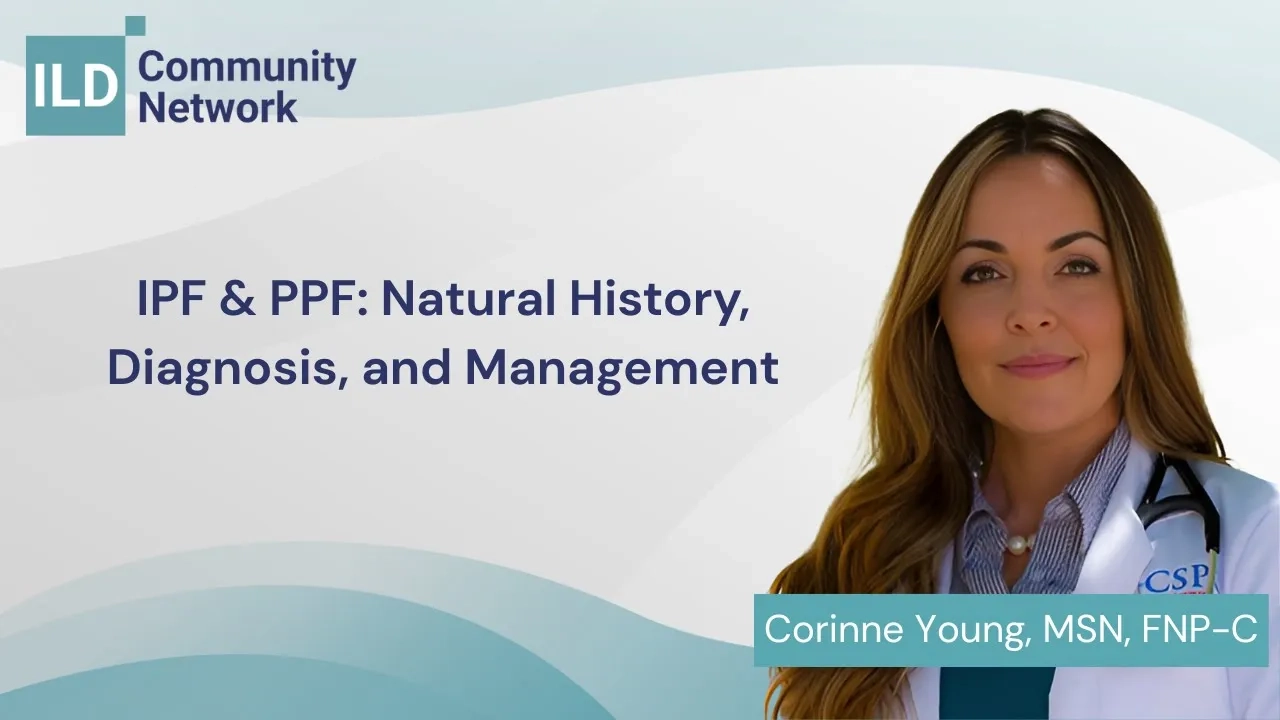

IPF & PPF: Natural History, Diagnosis, and Management
 October 2025
October 2025
 07:52 m
07:52 m
In this educational session, Corinne Young breaks down the underlying mechanisms, progression, and management of idiopathic pulmonary fibrosis (IPF) and other interstitial lung diseases (ILDs). The discussion covers common genetic and environmental risk factors—including family history, smoking, and occupational exposures—and explains how chronic inflammation leads to fibrosis and loss of lung elasticity. Listeners gain a clear understanding of how progressive pulmonary fibrosis is identified through lung function tests (FVC, DLCO) and imaging changes over time. The presentation also addresses treatment strategies, highlighting when corticosteroids may be appropriate, why long-term steroid use is limited, and how newer antifibrotic and immunomodulatory therapies are improving outcomes for patients with fibrotic lung disease.
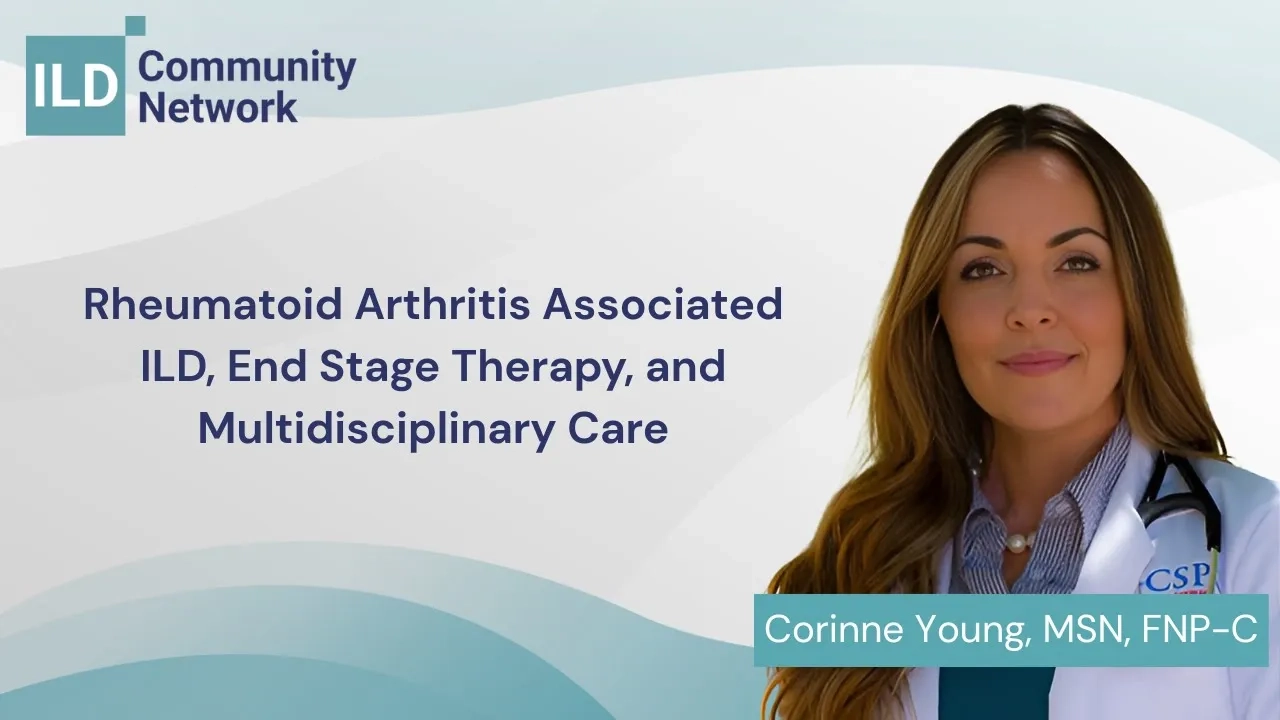

Rheumatoid Arthritis Associated ILD, End Stage Therapy, and Multidisciplinary Care
 October 2025
October 2025
 02:31 m
02:31 m
In this discussion, Corinne Young explores the complexities of managing patients with advanced interstitial lung disease, emphasizing the importance of early referral for lung transplant and cautious evaluation of unproven stem cell therapies. The conversation highlights how patients are sometimes misled into costly, non-evidence-based treatments abroad and underscores that only limited data exist for hematopoietic stem cell use in this setting. The speakers stress the critical role of multidisciplinary collaboration among pulmonology, rheumatology, gastroenterology, and cardiology teams, along with early conversations about palliative care and quality-of-life goals. With new therapies emerging, the focus remains on preserving lung function, aligning treatment with patient priorities, and ensuring compassionate, coordinated care for those facing progressive disease.






